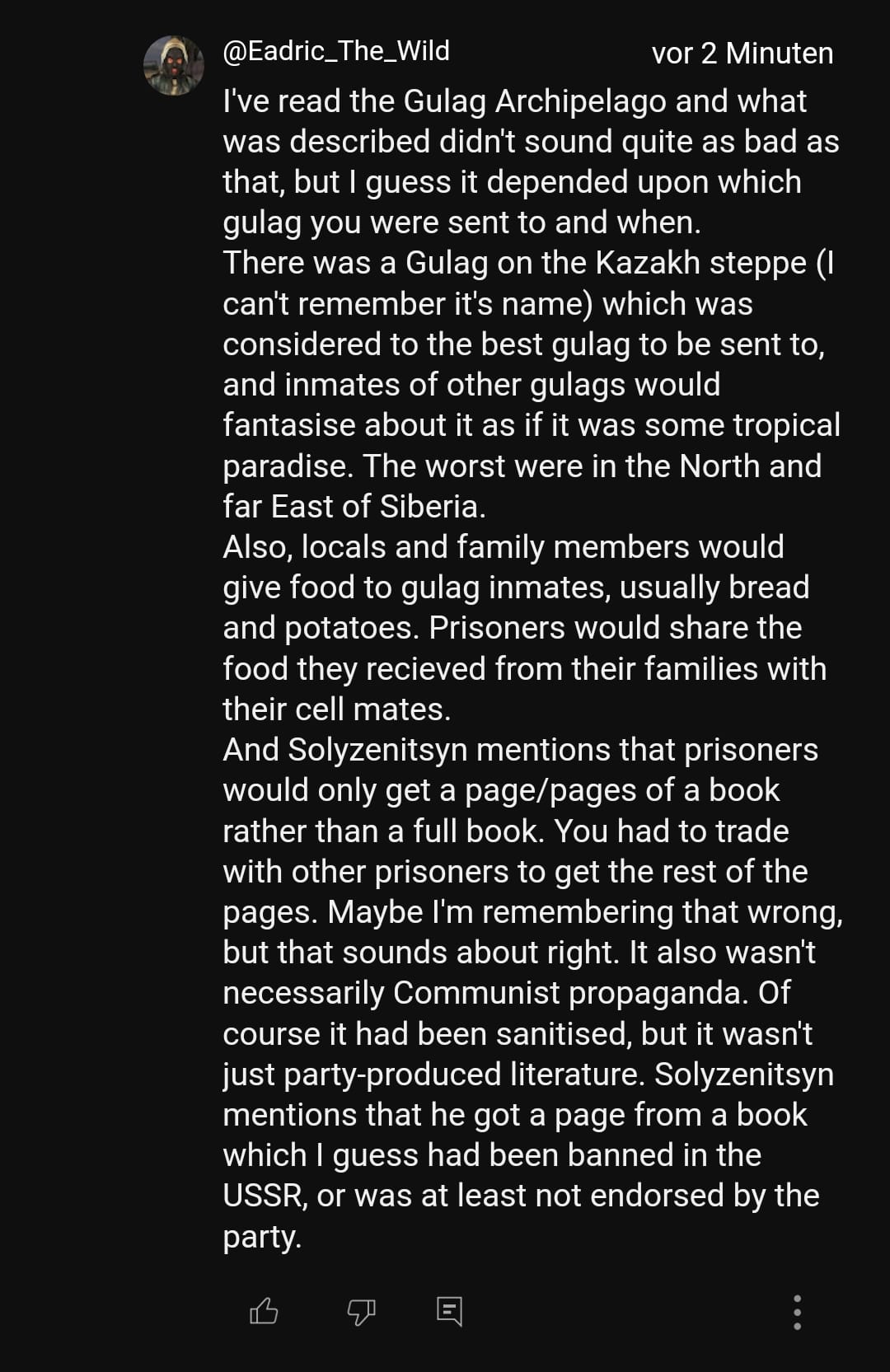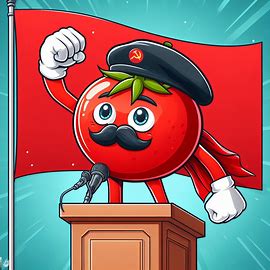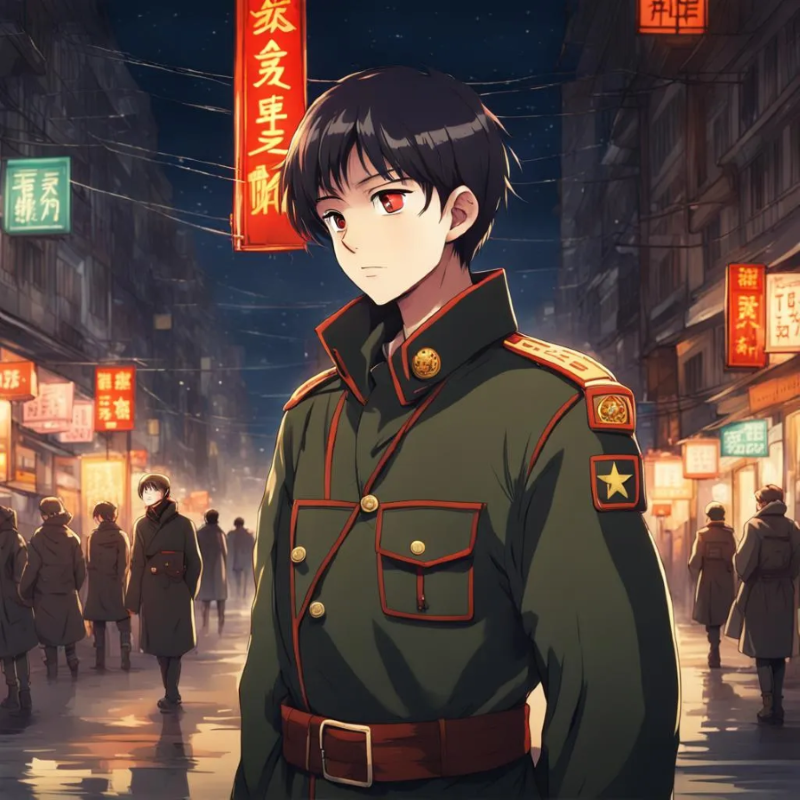
Funny how every one of these ardent anti-coms will fail to describe these prisons as sounding anything worse than a pretty regular prison (and far less horrific than prisons in the US), and they always have some ancestor who “suffered” in them, but tells stories like this about how it was unpleasant, but not exactly the “all murder all the time” that anti-coms like to imply.
I’ve thought about why they scream “GULAG!!!” so much, and I think it is because concepts like imprisonment and innocents are so heavily manipulated in western thought. Prisoners in the US “deserve” pain and suffering because they are “bad people” so that makes their conditions ok. US good, therefore people put in prison for going against the US status quo are bad. The USSR was the opposite, they were an “evil” country, which means people opposing that country were automatically “good” and therefore “innocent.”
I notice literally every single one of these gulag shrieking anticoms fail to mention why anyone was ever locked up, and if they do, it’s always a vague “opposing the evil soviets.”
And every time you look into their history, you find that their “opposition” was more along the lines of “supporting the nazis as a 5th column.”
While I agree with your last line in spirit (the West demonstrated many times that they would uphold literal nazis as innoncent victims of communism if it served their propaganda purposes), it is important to note and repeat anytime it comes up that 95% of gulag inmates were ordinary, non-political criminals, according to the CIA:
Yeah, good call. That was kind of my point, that most of them were criminals but it kind of got away from me there, thanks for clarifying!
No worries, and to be clear the point you ended up making isn’t unimportant either - we shouldn’t hyper focus on the 95% statistic and thereby seem to acknowledge the lib idea that any actual “political prisoner” in the USSR was an innocent saint. Counter-revolutionary actions naturally can and should be punished (depending on severity) in a socialist society.
Another prisoner, who had been in Sin Sing, San Quentin, as well as in jails of England, Spain and Germany, before he was picked up by the Soviets for grand larceny, had been reclaimed by the Baltic-White Sea Canal. He had done a bit of engineering in his youth, and was promptly given a chance to work at this specialty. He won a medal, pursued his studies further, and was doing brilliant work on the Moscow-Volga Canal when Dr. Callcott met him. To her query about his reformation he replied:
“In the other countries they treated me like a prisoner, clapped me in jail and taught me my place. Here they clapped me on the back and said ‘What can we do to make you into a useful citizen?’”[…] Bolshevo Commune, the most famous “cure” for criminals can be entered only by application approved by the general meeting of members. Its waiting list is so long that it accepts only the most hardened cases, priding itself on being able to make over persons who cannot become cured in any other institution. Its strength lies in its large membership of intelligent former criminals, who apply to new entrants their intimate knowledge of the criminal mind.
Anna L. Strong, This Soviet World, Chapter XIV
(Emphasis mine, because of “2)” in OP image)
The further I get in this book, the more my heart breaks from the loss of what was built.
Don’t be sad for what was lost. Be happy for the fact that what is written there will be the future, everywhere.
You’re right. It also gives me hope.
What we once had, we can build again!
Between this and all the North Korea stories, I’m convinced capitalists think socialism is just one big battle royale.
The Bolsheviks gathered every citizen in Russia and dropped them outta a big plane to fight to the death.
My uncle once told me I wouldn’t survive a single day in a socialist country. When pressed for why he basically said they’d kill me for being white under the assumption I’m rich, so they can loot my corpse for valuables
“Hand over your bottlecaps whitey!” Is Xi Jinpings catchphrase after all.
Your uncle makes me want to read more Fanon on his behalf, cause that’s some post-colonial psychology there
and unlike Fortnight, they don’t have para-gliders or parachutes. Despite this senseless violence internally and shooting each other they were able to build nuclear weapons and nuclear power. The nuclear power plants sometimes melted down, but that just made living in the USSR more exciting. Just like Fortnight there is a zone that keeps on getting bigger that you just can’t live in while other people are competing for fewer and fewer available resources. Fortnight is an accurate depiction of life in the USSR that somehow was a threat to the United States.
That’s capitalism though
Well yeah, how else are you gonna produce all those muscular New Soviet Men?
deleted by creator
Becoming a ‘gulag delivery person’, riding your horse (?) between gulags, bartering with all the local tribes (?!) stealing the dog meat meant for the gulag dogs (??!) that was being delivered by horseback courier (??!!)
Spaghetti western plot.
why not just ride off to Mongolia lmao.
“most guards were former prisoners” means it wasn’t the extermination camp they’re trying to hint at.
Not even their lies are consistent.
The point about the cold is funny because the majority of gulags were located near (big) cities, so even if it was freezing you’d be in a city soon lol. Like, there’s 0 effort involved in debunking a point like that.
Which makes sense, because prisons need personnel and regular supplies and stuff. Building them all in the middle of nowhere makes finding personnel difficult and supplying needlessly costly. You don’t see the US building prisons in the far north of Alaska for the same reasons. I swear all these ‘critics’ never seem to think about the USSR being an actual country that needs logistics to operate instead of being a comic book lair of villains.
The point about the cold is funny because the majority of gulags were located near (big) cities, so even if it was freezing you’d be in a city soon lol. Like, there’s 0 effort involved in debunking a point like that.
Wait, I never heard of that point… what’s the closest one to Moscow?
Those inside Moscow I’d guess. We think of gulags as prisons, with defined locations. But it seems as if they, at least some, were more temporary. Which makes sense when considering they were for construction jobs, which might take you from the Moscow to the Volga, or from the Baltic to the white sea.
Gulag archipelago was like made the fuck up anyways. This is like if I wrote a storybook about evil Biden eating children and then using it as proof of US bad (reality is probably worse, doesn’t change the justification being stupid)
Tell that to my history professor who keeps bring it up in class any chance he can get. Every time he talks about it a little part of me dies. Thank god it’s finals week…
If I had the bad fortune to end up in a gulag, I’d just be the one building it, meaning I’d have intimate knowledge of my own prison’s architecture. Next, my guards would be former inmates, so they’d likely be more sympathetic towards me rather than our jailers. Oh, and I’d apparently have enough free time to sit around and read volumes of Communist theory. Finally, if I decided to not finish off my sentence, I could just… leave.
Yeah. Okay.
They always go so hard on making every individual point as wild as possible that they become mutually incompatibile
If you’re making stuff up and it’s worse than gulag archipelago maybe take stock of why you’re doing it or why your relative is telling you these stories
It’s wild that in their list of bad things about gulags (which are all clearly works of fantasy) they include that inmates were allowed to read and watch films.



















